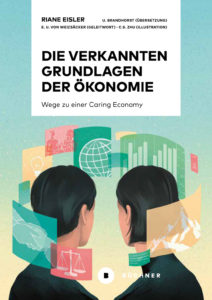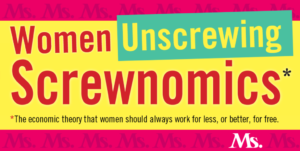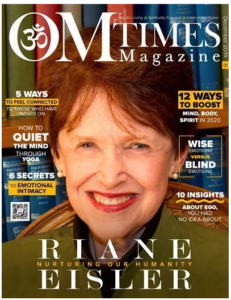Below you will find articles, interviews, and speeches about Partnership Systems under these topics:
- Economics, Business, & Organizational Development
- Education
- Environment
- Evolution and Cultural Transformation
- Family
- Partnership Culture
- Peace, Human Rights, Violence & Terrorism
- Spirituality & Sexuality
To find articles sorted by topic, please see the "By Role/By Issue" pages under Take Action.
Reclaiming Spiritual Wholeness
by Riane Eisler for the Spring 2021 edition of Kosmos Journal for Transformation (2021).
This article begins by taking the reader along Riane’s own spiritual journey and connects the individual level corporeal and spiritual experiences to the larger legacies of spiritual history and religious heritage by referencing a multitude of archaeological and theological sources from around the world. As is the case in much of Riane’s work, the article empowers its reader to transform their spiritual teachings and journey; it contains clear steps that can be taken to “leave behind the domination part of our religious heritage and strengthen the partnership spirituality and morality we so urgently need."
Patriarchy and the Notion That Sex Is Worse Than Murder
By Georgia Platts for The Good Man Project (2021).
The Good Man Project, which has a long-standing relationship with CPS, published this illuminating article referencing the recent tragic mass murders of Asian women in Atlanta, GA. Sociologist Georgia Platts, demonstrates the associations between gender equality and sex-positivity using her own research as well as engaging with the cultural histories and concepts of domination and Partnership systems prevalent in Riane Eisler’s work.
4 Ways to Shift Toward a Caring Economy
By Laura Giradorou Koch for the Real Leaders Magazine (2021).
The article draws from decades of research and activism work of Riane Eisler, drawing from the recent and demonstrative impact of COVID-19 and the need for “critical pillars of the caring economy”.
Creating a Post-Pandemic Caring Economy
By Lisa Reagan for Kindred (2020).
In her interview with Riane Eisler, Lisa Reagan asks how we can come to terms with the symptoms of a domination culture in this time of COVID, and begin to “move into a worldview/consciousness that not only perceives wholeness, but is capable of embodying the life-affirming values necessary to create a caring economy”.
Partnerism: Humanity’s Next Great Adventure for the Post-Coronavirus World
By Jed Diamond for Willits News (2020).
In this article, Diamond shares his understanding of Riane Eisler’s work in cultural evolution in the context of relations between women and men; and how a new awareness of Partnership Systems, or Partnerism, can help the wounds of age-old hierarchical domination patterns.
Diamond: “At a time when many women were blaming men for the dysfunctional state of the world, it was refreshing to find a scholar who recognized that both men and women have been harmed by a dominator system and both sexes need to come together in order to heal our relationship with ourselves, each other, and the community of life on planet Earth”.
Singing the She-cession Blues: How the Pandemic Is Revealing Existing Fault Lines in the U.S. Economy
By Rickey Gard Diamond for MsMagazine (2020).
The work of Riane Eisler and the Center for Partnership Systems is mentioned in Ms. Magazine’s “Singing the She-cession Blues: How the Pandemic Is Revealing Existing Fault Lines in the U.S. Economy” by CPS partner Rickey Gard Diamond. Part of the Women Unscrewing Screwnomics series, this article highlights the sobering effect of the COVID pandemic on the economic status of women, noting that the Labor Department reported an alarming 865,000 women left the workforce in the month of September.
The Ms. article mentions the Center for Partnership Systems Social Wealth Index (SWI) project: “A new Social Wealth Index from The Center for Partnership Systems measures the returns in economic health when we invest in caring for our families, communities and nature”.
We Can Change the Rules of the Game
By Riane Eisler for Austrian news source ORF (2020).
In We Can Change the Rules of the Game, Eisler refers to her book The Real Wealth of Nations— the German version titled “The Misunderstood Foundations of the Economy”—calling for economic change. Eisler “…describes today’s economic system as “neither sustainable nor fair”. It is not able to cope with current or future challenges. The pandemic is forcing us to question our “old normal”; we have to move on to an economic system that I have called the ‘Caring Economy of Partnerism’”.
What is Normal? Are We Shifting to a Caring Economy?
By Laura Giradorou Koch for Business Fit Magazine (2020).
In this comprehensive article, Koch highlights the work of Riane Eisler, specifically four foundational aspects of a caring economy:
- To value and make visible caring for the environment
- To value and make visible the work of care
- To invest in the development of early childhood education: our most important asset
- To pursue transparency and metrics in the Caring Economy: changing our measures of economic health
Koch points out that GDP “…fails to include as productive the care work in households despite studies showing that if this work were included it would represent between 20% to 50% of GDP. Not included is the social and community caring work which most of the time is for free and gives value to society. Riane Eisler's Social Wealth Economic Indicators (now the Social Wealth Index or SWI) is a good alternative to authentically evaluate a nation’s prosperity”.
Riane Eisler: Nurturing our Humanity
By Sandie Sedgbeer for the OM Times (2019).
In the interview, Sandie Sedgbeer talks with Riane about her new book, Nurturing Our Humanity: How Domination and Partnership Shape our Brains, Lives, and Future, co-authored with anthropologist Douglas P. Fry, in which they “both upend age-old assumptions about human nature and provide irrefutable evidence that not only is caring behavior humanity’s default tendency but also that we can build more humane and sustainable societies”.
Eisler comments, “…in Nurturing our Humanity, I combined my research and my new approach to understanding human societies with two new, very important areas. One is neuroscience because we’re learning that our brains develop differently when we are oriented more to the Partnership or the domination side of the social continuum. The second area is Doug Fry’s area of expertise: what he calls ‘foraging societies’ show how humans lived for millennia in original Partnership societies”.
A Breakdown of How Love Can Help Solve Some of the World’s Most Pressing Problems
By Riane Eisler for Thrive Global (2019).
In this article, Riane Eisler takes a hands-on approach to how love can help us address major global issues. “Findings from both social and biological science indicate that love may be the key to helping us solve some of the world’s most pressing problems”.
This human capacity to care–which neuroscience shows is integral to our species – is central to creating the type of social system that will help us find creative solutions to pressing issues such as: How can we preserve our life-supporting natural environment? How can we close the widening gap between haves and have-nots, effectively address poverty, and end destructive financial practices?
Breaking Out of the Domination Trance
By Riane Eisler for the Winter, 2018 edition of Kosmos Quarterly (2018).
In this article Riane Eisler shares the traumatic story of fleeing with her family from the Nazi occupation of Austria as a girl, and growing up as a post-war refugee in Cuba. Asking the question: “Why, when we humans have such an enormous capacity for consciousness, caring, and creativity—has there been so much insensitivity, cruelty, and destructiveness? Is it inevitable, or are there alternatives?”, she outlines her work researching the roots of domination and Partnership societies, and shows how we can work within the framework of four societal cornerstones.
Toward an Integrated Progressive Agenda
by Riane Eisler, for the Next System Project (2017).
This comprehensive article discusses the roots of domination and provides an overview of new thinking, categories, and agendas called for to support our orientation towards a Partnership system.
Feminism, Fear, and the Strongman: Women and the New Progressive Agenda
By Riane Eisler and Valerie Young for The Huffington Post (2017).
This article focuses on understanding how and why the struggle over gender norms is a major factor behind the current US political and cultural regression.
If the momentum unleashed by women taking up the call to action is to have lasting impact, it must drive a progressive agenda that will reverse the current regression toward misogyny, scapegoating, and “strongman” rule in both the family and state. This requires long term, focused work – and an understanding of how and why the struggle over gender norms is a major factor behind the current US political and cultural regression.
Building a Caring Democracy
By Riane Eisler for the Interdisciplinary Journal of Partnership Studies, Volume 4, Issue 1 (2017).
Riane Eisler is the Guest Editor for this issue. Eisler discusses the four cornerstones of building a caring democracy and the need for an integrated progressive agenda.
This article outlines a caring economics or Partnerism that supports not only human survival but also human development. It proposes a full-spectrum economic map and economic policies needed at this time when many jobs are being replaced by automation. It looks at issues generally ignored in the conversation about a new economics, such as intra-household resource allocation, the devaluation of women and the ‘feminine,’ and the view that caring for people, starting in early childhood, is merely reproductive rather than productive work.
The Caring Family Policy Agenda
By Riane Eisler for the Center For Partnership Systems (2017).
As practical as it is principled, the Caring Family Policy Agenda is based on the shared core moral principles of religion and humanism: caring, compassion, justice, and nonviolence. Its principles and programs are easily articulated and have powerful emotional appeal. The Caring Family Agenda has three interacting components:
- Children's Bill of Rights
- Caring Family Values
- Family-Friendly Economy
Societal Contexts for Family Relations: Development, Violence and Stress
By Riane Eisler for Center For Partnership Systems. New York, NY: Oxford University Press (2016).
Nurturing Children's Humanity: Partnership Education
by Riane Eisler for the Interdisciplinary Journal of Partnership Studies Vol 2.2 (2015).
Riane Eisler interviews Jennifer Siebel Newsom, wife of the Governor of California, the most populous U.S. state, who chose the title First Partner rather than First Lady to describe her position. In addition to her role in crafting Partnership government policies, Jennifer is a mother, actress, and noted filmmaker, whose documentaries Miss Representation, The Mask You Live In, and The Great American Lie have gained wide acclaim. She has been a leader in California and internationally in raising awareness of the need for, and benefits of, caring Partnership government policies.
Protecting the Majority of Humanity: Toward an Integrated Approach to Crimes against Present and Future Generations
by Riane Eisler for Cambridge, U.K.: Cambridge University Press, (2013).
Read Riane Eisler’s article Protecting the Majority of Humanity: Toward an Integrated Approach to Crimes against Present and Future. Published in 2013, this chapter in a Cambridge University book introduces a new approach to protecting women and children. It shows that the human rights of present and future generations must include the private sphere of family and other intimate relations and how international law, including the Crimes Against Humanity section of the Rome Statute can be used to achieve this vital goal.
Breaking the Devastating Link Between International Terrorism and Intimate Violence
by Riane Eisler for Feminist Collections: a Quarterly of Women's Studies Resources; Madison Vol. 25, Iss. 4 (2004).
Read Riane Eisler’s article Breaking the Devastating Link Between International Terrorism and Intimate Violence. Dr. Eisler addresses the connection between international terrorism and family violence and what we can do to break cycles of violence in our lives and communities. Her research shows that throughout history, the most violently despotic and warlike societies have been those where violence, or the threat of violence, is used to maintain domination of parent over child and man over woman.



